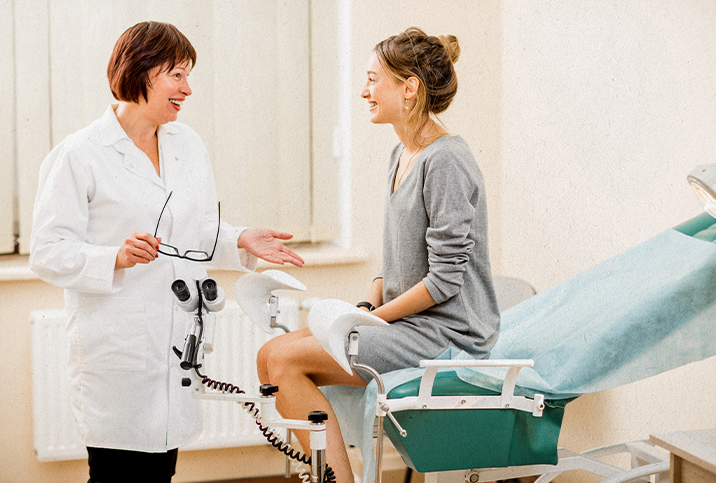Improving Vaginal Health

Your vaginal health is dependent on daily hygiene practices, your routine before, during and after sex, and the preventive care you practice with your gynecologist. Even small changes to an established routine can improve your physical well-being and have a direct impact on improving your vaginal and sexual health.
An overview of the vagina
The vagina is the internal canal that leads to a woman's cervix. A woman's external anatomy in her groin are the pubis and vulva.
The vagina is an internal organ; it's the elastic "channel" that connects to the female reproductive organs. This channel contains a complex microbiome of microorganisms that is both delicate in its balance and robust in its ability to protect the body from pathogens. The external pubis and vulva are also important components to vaginal health.
What makes a vagina healthy?
Vaginal health starts at the vulva by ensuring proper care of the pubis, both the labia minora and labia majora (the folds of skin found here, both internal and external), and the vaginal opening.
How you care for the vulva and surrounding pubis can have an impact on the vagina and even the urinary tract. The vagina maintains its own complex microbiome with the largest and most diverse collection of microbes in the human body, outside of the bowel. This community protects the interior cervix and vaginal walls, as well as exterior vulva, from infection-causing pathogens.
Vaginal health is a culmination of the vaginal flora balance and the health of the vaginal walls and cervix. The state of your vagina is also often representative of the health of the vulva. If you have an infection, the symptoms often appear in vaginal discharge and cause irritation to the labia majora and labia minora. You may experience itching, redness, burning or even pain during urination and sex.
Keeping your vagina healthy
A healthy vagina starts from the outside. The pubis and labia majora should be clean and free of any infections or parasitic sexually transmitted infections (STIs). Any sores or lesions are signs of infections that need immediate care and treatment. Contrary to societal stigmas, the shape, color and concentration of pubic hair has little to do with vaginal health and is completely unique to each person.
The labia majora (outer lips) should be moist, supple and blemish-free. The labia minora (inner lips), clitoral hood and the clitoris should be free from discharge or buildup. While odor is natural, a foul smell could indicate infection. It was once thought that a buildup of vaginal discharge was an indication of a yeast infection, but now we know the opposite is true. While discharge buildup should be removed, this is actually a sign that your vagina is properly cleaning itself.
The vaginal opening should not be swollen, red or have any open sores or wounds. Pain, soreness, irritation and itching are all signs that your vagina is unhealthy. When these conditions accompany a change in vaginal discharge, this can be a sign of bacterial vaginosis or a yeast infection.
A healthy vagina will have discharge, and it's quite common for the quantity, color and texture of the discharge to change throughout your monthly menstrual cycle. The discharge around ovulation is clear and stretchy, like egg whites. At other times, it is more opaque and thicker. Everyone is different, so what is typical for you is the primary indication of your vaginal health.
Lifestyle choices for a healthy vagina
The healthiest hygiene choice for your vagina is to leave it alone to clean itself. Women should only interfere when there are clear signs of an infection. The medical community recognizes that vaginal douches strip the vaginal walls of nourishing lubricants and can destroy the vagina's healthy microbiome. They are unnecessary, no matter what advertising says.
Using scented wipes, perfumes and body wash in the vulva area can also cause irritation and infection. Wash the vulva and pubis with warm water only, and do not insert any cleansing products into the vagina. Protecting the flora balance and naturally acidic pH in the vulva and vagina is key to avoiding irritation and bacteria, which can lead to infection.
If you must use some kind of body cleanser in the vulva area, use only a pH-balanced cleanser specifically recommended for use here. Note that any soap that enters the vagina will likely irritate the delicate tissue of the vaginal opening, which can lead to painful vaginal dryness. Harsh deodorant soaps are not recommended for cleaning the vulva; moisturizing soaps are preferred.
Clothing choices matter
Tight or form-fitting synthetic fabric is not recommended if you are concerned with vaginal wellness. This fabric choice can restrict airflow to the vulva, which increases sweat production and can change vaginal pH levels. This can actually increase your chances of developing a yeast infection or urinary tract infection (UTI). Instead, choose clothing made of natural cotton or moisture-wicking materials, which allow free movement and reduce moisture in the groin.
If you must wear something form-fitting, such as workout clothes, permit your body to breathe when you get home. This can mean going commando to allow your vulva to get proper airflow. Sleeping without panties is advised, as is going without underwear at home whenever you can. These practices give your vulva area the opportunity to get the ventilation it needs to stay balanced and healthy.
Also, avoid tight-fitting underpants and skip the thong, particularly when working out—they may increase your chances of developing a yeast infection and/or a UTI.
Sexual hygiene and safety
It's important that both you and your partner are relatively clean before sex, because any bacteria that is present on either one's genitals can find their way into your vagina during sexual intercourse.
Choose a natural lubricant that does not contain parabens or glycerin, which can alter vaginal pH. Coconut oil is the best and safest natural lubricant, but it can destroy the latex in condoms, so check your lubricant for its compatibility with your condom brand.
After sex, it's important to urinate promptly to flush any bacteria from the urethra opening as well as the opening of the vagina. Any semen or lingering discharge can cause irritation to the vulva and vaginal opening.
Thoroughly clean your sex toys to remove all bacteria and excess lubricants. These lubricants and even the cleaners you use can degrade sex toy materials over time, which could possibly permit chemicals found in sex toys to be absorbed into your vaginal tissue. Wash with mild soap and warm water, and allow the toys to dry fully before using them.
Diet and exercise for a healthy vagina
Making changes to your diet and exercise routine can also improve your vaginal health. Try to be active for at least 30 minutes a day, and maintain a diet full of fresh fruits and vegetables.
You can also improve vaginal health by eating foods that promote the naturally acidic environment of the vagina. Probiotic supplements and fermented foods or yogurts that contain naturally occurring probiotics can help maintain a healthy pH balance. Probiotic pills that contain acidophilus or lactobacillus also encourage good bacteria to populate a healthy vagina.
Eating a diet that is low in saturated fats, sodium and refined sugars can also lower blood pressure and eliminate plaque in arteries, which can improve circulation throughout the body, including the vagina and vulva.
Exercise can help by strengthening the pelvic floor, which supports vaginal elasticity, and digestive and urinary function.
Gynecological care
Seeing an obstetrician or gynecologist regularly is a pillar of vaginal health, because they will perform preventive examinations and testing to ensure early detection of cervical or ovarian cancer. Monitoring your vaginal health in between annual pelvic exams is necessary for the accurate diagnosis of vaginal or pelvic infections, which can sometimes lead to cervical cancer.
While your gynecologist can easily diagnose and treat signs of infection, you can help by observing your monthly vaginal health habits and noting any changes. That can help your gynecologist identify chronic infections, parasitic conditions and even life-threatening sexually transmitted diseases (STDs).
An annual Pap smear can help identify cervical precancer. Early diagnosis and treatment of cervical cancer can increase the chances of survival. Disclosing symptoms such as chronic constipation, bloating and abdominal pain can also help your physician identify other conditions, such as endometriosis, ovarian cysts and ovarian cancer.
Tracking your vaginal health
Using health tracker apps can help you track your vaginal health. Make an annual wellness checkup with a gynecologist and be sure to report any changes or causes for concern. Being proactive about your vaginal health can let you help your physician make an informed diagnosis and suggest the best treatment.
As with every aspect of your health, making choices that improve the health of your vulva and vagina will positively impact your physical and sexual health for many years to come.


















